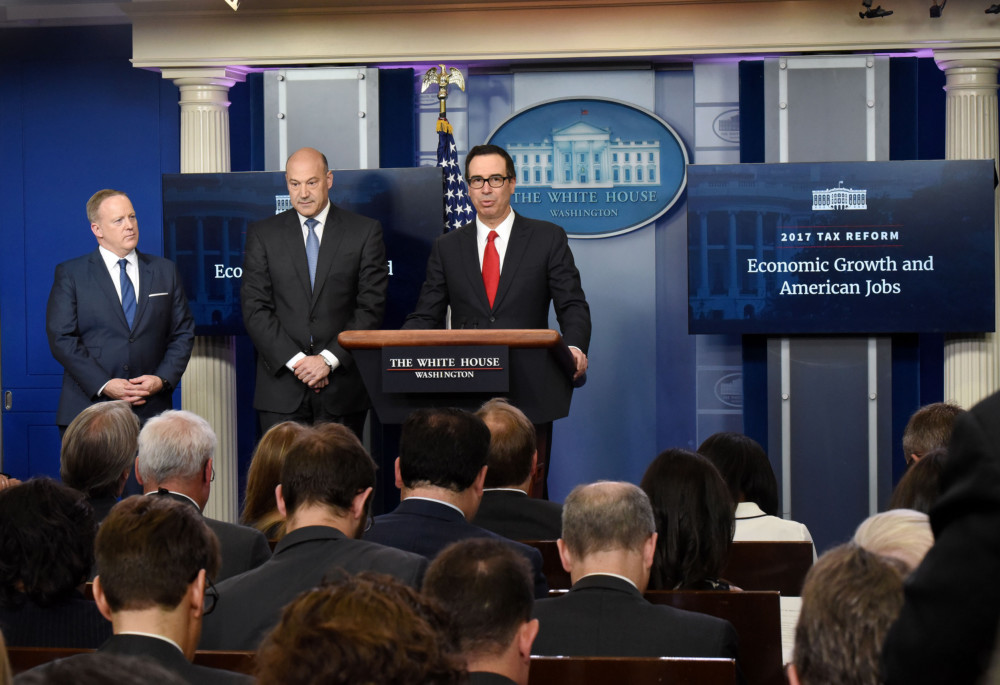By Alex Daugherty
McClatchy Washington Bureau
WWR Article Summary (tl;dr) The tax plan which was unveiled today includes a 15 percent corporate tax rate, a 20 percentage-point drop from the current rate, along with the elimination of all tax deductions except for mortgage interest and charitable giving.
WASHINGTON
The White House announced a broad tax overhaul plan on Wednesday that would dramatically cut taxes for corporations, but it did not explain how the government would pay for the massive tax reductions.
Treasury Secretary Steven Mnuchin and chief economic adviser Gary Cohn billed Wednesday’s announcement as a starting point for potential legislation and repeatedly said President Donald Trump’s administration would work with Congress before coming up with a more specific plan.
“We are in constant dialogue with the House and Senate,” Mnuchin said. “We have a broad-brush view of where we are going to be, and we will be back to you with very firm details.”
The plan includes a 15 percent corporate tax rate, a 20 percentage-point drop from the current rate, along with the elimination of all tax deductions except for mortgage interest and charitable giving. Cohn and Mnuchin also said the estate tax, known by detractors as the “death tax,” would be immediately repealed.
There would be three tax brackets for personal income, 10, 25 and 35 percent, instead of the current seven.
“This isn’t going to be easy; big things never are,” Cohn said. “We’re going to be attacked from the left and from the right.”
The attacks from the right include criticism of a controversial tax on imported goods known as a border adjustment tax, which Trump has mentioned in the past but which multiple Republicans have described as a nonstarter in negotiations because it would hurt retailers.
House Speaker Paul Ryan, R-Wis., is an advocate of the border adjustment tax. He argues that it would help make a tax overhaul revenue neutral and would encourage companies to create American products and jobs.
Cohn and Mnuchin did not specify whether a border adjustment tax would be part of the president’s plan, but some congressional Republicans want to see it gone.
“I’m glad the border adjustment tax died. It was so complicated. I couldn’t explain it; it gave me a headache,” said Sen. Lindsey Graham, R-S.C. “I can understand going to 15 versus some other number, so this is a good start. I support the idea of lower rates.”
Rep. Roger Williams, R-Texas, said the lack of specificity by the White House on a border adjustment tax was a sign that Trump wasn’t a fan of a tax on imported goods.
“The border adjustment tax is not the way to go,” Williams said. “I think he’s done an outline and I think he’s sending a message, but the fact of the matter is that if you cut taxes you create more taxpayers.”
There are some differences between Trump’s plan and the House Republican leadership’s plan.
Ryan’s plan includes a 20 percent corporate tax rate and the three personal income tax brackets are 12, 25 and 33 percent.
The White House plan also would repeal a 3.8 percent tax on net investment income, known as the capital gains tax, that helps to fund Obamacare, and includes a one-time tax on overseas profits that Mnuchin said will bring in “trillions” of dollars.
Grover Norquist, president of the influential conservative group Americans for Tax Reform, praised the announcement in a statement.
“President Trump has re-energized the drive for fundamental tax reform that creates growth and jobs,” Norquist said. “Reducing taxes on all businesses down to 15 percent will turbocharge the economy.”
It’s not clear how Congress would pay for Trump’s proposal without dramatically increasing the federal budget deficit. Mnuchin suggested that increased economic growth would pay for a tax overhaul effort.
If a tax plan would increase the federal deficit after 10 years it must obtain 60 votes in the Senate to pass, which is highly unlikely given that Republicans hold only 52 seats.
The nation’s tax code hasn’t been significantly altered since 1986.
___
(Franco Ordonez and Anita Kumar contributed to this report.)














































































































































































































































































































































































